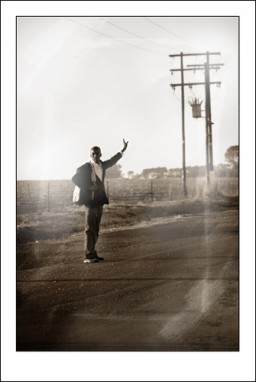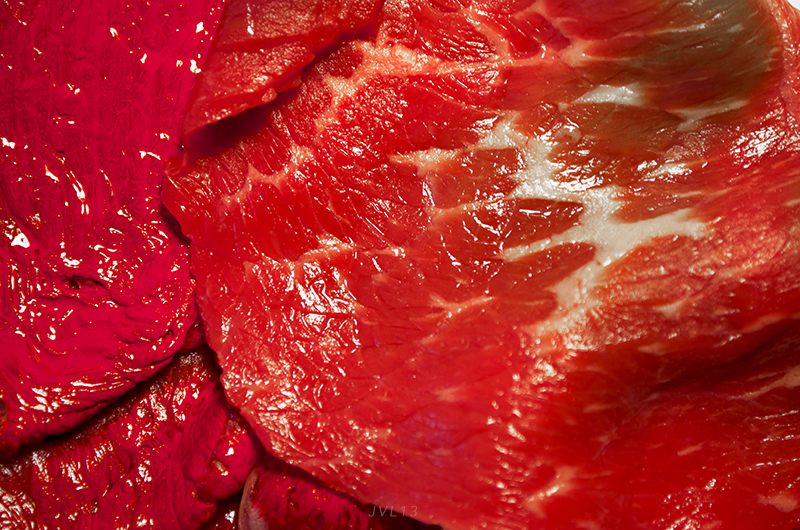
Siyabonga is a self made man. His inquisitive look has the hint of an amused smile, the kind you find among men who are assured of their success. Having grown up under Apartheid rule in South Africa, he has worked his way up to become the owner of several successful businesses. His most recent venture is a start up operation which launched in 2008. It consists of a 250 hectare blueberry farm located in the Eastern Cape. The business plan foresees the company to eventually grow blueberries on 230 hectares under weather protecting nets.
Siyabonga is part of a black middle class in South Africa which has slowly but surely grown since the end of Apartheid. As a black entrepreneur Siyabonga has also benefited from Black Economic Empowerment (BEE), South Africa’s token redistribution policy.
BEE was first implemented in 1994 and envisioned to address the inequalities created over 40 years of Apartheid. Intended to support historically disadvantaged people, BEE includes measures such as employment preference, skills development, management support, and preferential procurement. Like any redistribution policy, BEE is controversial. According to a recent article in ‘The Economist’, Black Economic Empowerment has not worked well, nor will it end soon.
BEE’s critics tend to follow one of either two narratives. The first being that favouring previously disadvantaged individuals makes little economic sense. It is seen as a vehicle for corruption and fraudulent business, true to the saying politics is a dirty business and business is shady politics. Yet in reality the role of BEE on the economy has been vastly overstated. Indeed there is not one empirical study which finds that BEE in South Africa has been a burden equivalent to the hysterical nature in which this policy is debated in the media or civil society. Conversely it has been shown time and again that the private sector has been far better at bypassing or evading BEE than the government has been at implementing it. Moreover, by discussing the costs and benefits of BEE in South Africa as a purely economic issue you are ignoring the political implications of 40 years of systematic economic suppression of blacks and colours under apartheid rule.
When the ANC got elected in 1994, some form of redistribution was politically unavoidable. Hence while there may have been an economic optimality of sequencing reforms for growth and development, ignoring the political pressures was impossible. Indeed, democratically elected governments face a constant trade-off between raising people’s living standards now or raising them in the future. Similarly, if the South African government would drastically deregulate and suppress wage inflation now, in theory, this would raise peoples incomes in the future. However, given we do not live in the confines of an economic model, such measures would certainly also lead to social unrest and further political instability.
This sort of argument, however, will find little sympathy among those clinging to the second narrative. Having lived in South Africa for many years, I had become accustomed to the recurring point of view expressed by white South Africans that they were living under a racist government. Yet the quality with which this was conveyed was what struck me most. While their words pertained to defiance, their voices had a curiously cautious quality.
Confronting Siyabong with this point of view, he shrugs and smiles. Yet the hint of sadness in his smile speaks volumes. He tells me that because race remains such a highly sensitive issue in South Africa today, many people are drawing the wrong conclusions. Sitting still and absorbed by this thought he says, “The real problem facing South Africa is not BEE, but the 47% unemployed black population which is becoming increasingly restless.”
Siyabonga is right. Despite the growing black middle class to which he belongs, the inequality gap between whites and BEE candidates has and continues to grow substantially. According to 2012 census statistics, the income of black South Africans has grown by 169 percent over the last decade, while that of the white population has grown by over 700 percent over the same period.
It is within this context that the failure to identify BEE’s true value can only be described as curiously naïve. Indeed, if the experiences of structural adjustment program’s of the IMF and the World Bank in the 1980s have taught us anything it is not to underestimate the importance of social cohesion and political stability on the path to growth and development. South Africa is no exception. Nor is social redistribution of this kind something exclusive to the South African experience. In fact almost every country in the world has similar policy measures. These simply reflect the political economy reality that is made up of the eternal tradeoff that governments face in terms of competing economic and political claims.
Ultimately only history can be the judge of BEE’s role in South Africa’s path to development. Yet as far as BEE’s critics are concerned, history has proven time and again, little things please little minds.
- Yanis Kühn von Burgsdorff
Yanis is a PhD candidate at the University of Cape Town
Photo by Nico van der Merwe, July 2009, Allanridge, Free State, ZA.



I’m almost afraid to comment - and at the same time I feel rightly justified in doing so.
I feel like BEE and Affirmative Action hold an almost voyeuristic power over black South Africans. My sister told me that she had brunch with a group of her friends this weekend. Her friends were a group of University Graduates that are private school educated, young men who often feel compelled to justify their ambition. They often feel oppressed because whatever level of success they achieve through their own hard work is often undermined and it is assumed that they achieved success because of their new positions of privilege. I think my generation is incredibly fortunate that there are policies that were put in place to raise the level of wealth and income equity that often holds many in this country under siege. The trouble is that there is a third side to your argument (which is very balanced, well done) - and that is that policies like these have created generally uncomfortable brunch conversations.
Many of my peers often feel afraid to speak ‘out of turn’ because we now have a relatively privileged seat at the table. However, many still come from far poorer backgrounds than their white counterparts. The sheer will of our parents to put us through school and afford us the same level of education is often not the same. While cultural capital and cultural identity try to study the socio-anthropological shifts in our measures of disadvantage, there isn’t much to measure ‘sheer will and determination.’ There are many stories like Siyabonga’s. Black-owned business often comes through struggle, grit and hard work - like white-owned business. And just like many of those who benefited corruptly from Apartheid policies, there are many who pocket from the policies that support BEE and AA.
I suppose that the dream is that a big policy, or a big story that results from these measures might one day inspire a great mind.